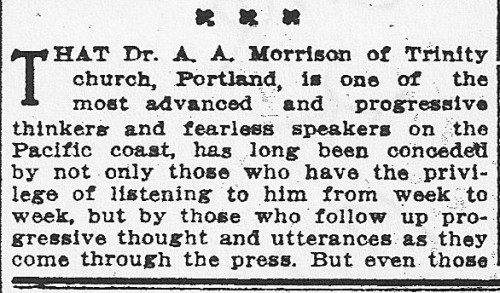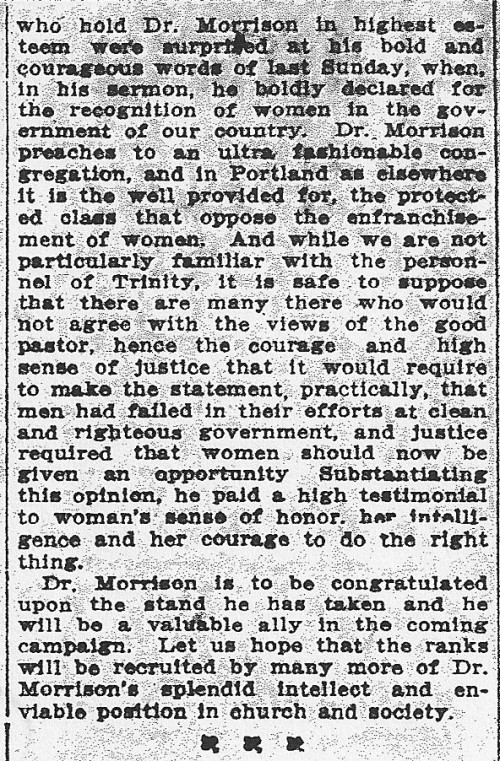June 1911: Sarah Evans Applauds Reverend A. A. Morrison’s Support of Woman Suffrage
One hundred years ago this month in her June 25, 1911 “Women’s Clubs” column for the Oregon Journal suffragist Sarah Evans praised Dr. A.A. Morrison of Portland’s Trinity Episcopal Church for “his bold and courageous words of last Sunday, when, in his sermon, he boldly declared for the recognition of women in the government of our country.” Evans congratulated him “on the stand he has taken” and claimed him as a “valuable ally in the coming campaign” to achieve women’s voting rights in the state.


Sarah A. Evans, “Women’s Clubs,” Oregon Journal, June 25, 1911, 5:5
This entry in Evans’s “Women’s Clubs” column is important and illustrative for what it tells us about this stage of the Oregon and national suffrage campaigns. First, this entry underscores the class divide in the votes for women movement as many elites (women and men) opposed woman suffrage. Evans noted that “Dr. Morrison preaches to an ultra fashionable congregation, and in Portland as elsewhere it is the well provided for, the protected class that oppose the enfranchisement of women.” The Portland Woman’s Club, of which Evans, Esther Pohl Lovejoy and other suffragists were members, would only formally endorse woman suffrage in early 1912. Other Oregon suffragists, Pohl Lovejoy included, would join Evans in challenging the arguments of this “protected class” of anti-suffragists. But in the 1912 campaign some wealthy Portlanders would cross class lines to work for the women’s ballot, among them Josephine Hirsch, who founded the Portland Equal Suffrage League.
The entry also underscores the view held by Evans and other suffragists that women’s different experiences (and for some, what they believed to be women’s different “nature” from men) were an important reason why they should have a full voice in government. As Evans noted, Morrison had “made the statement, practically, that men had failed in their efforts at clean and righteous government, and justice required that women should now be given an opportunity. Substantiating this, he paid a high testimonial to women’s sense of honor, her intelligence, and her courage to do the right thing.”
Evans lauded Morrison as “one of the most advanced and progressive thinkers and fearless speakers on the Pacific coast.” She concluded: “Let us hope that the ranks will be recruited by many more of Dr. Morrison’s splendid intellect and enviable position in church and society.”
In June 1911 there were still many more allies to be won for the cause. But Evans counted Morrison as an important ally and noted his courage to challenge his elite congregation in the city to support the votes for women campaign.
—Kimberly Jensen
Want to read more articles from Oregon suffrage campaigns? Click here
Permalink

